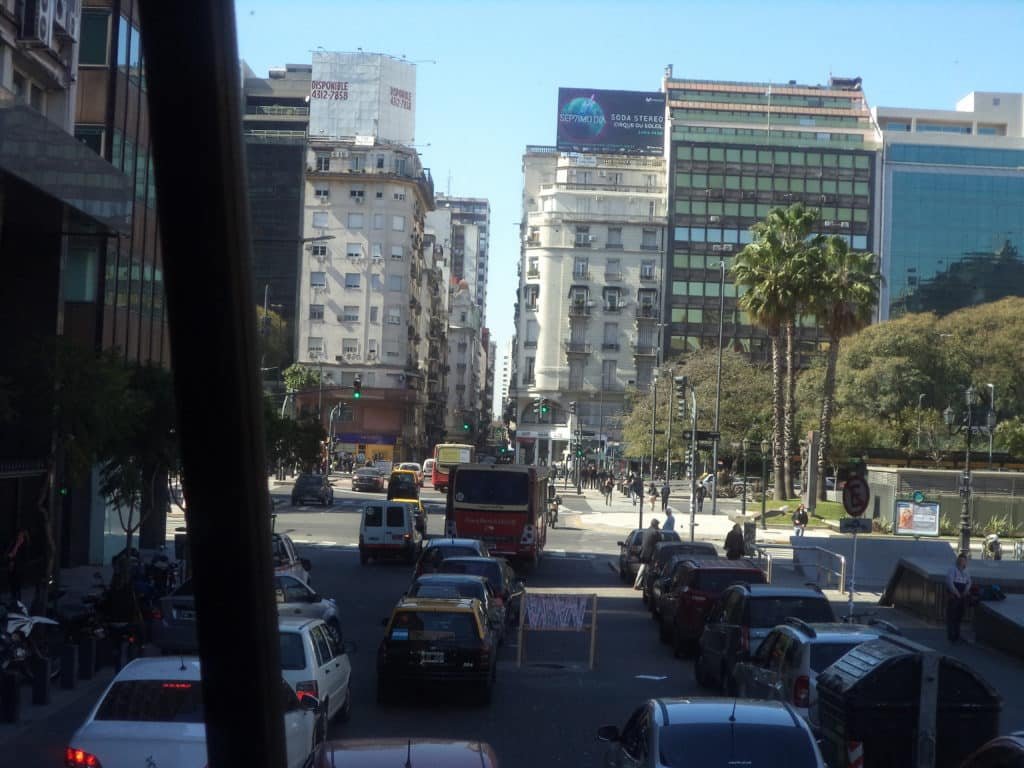
As with any big city, it is the people on the street that you meet that determine the quality of your experience. Hostel Puerto Limon makes you want to stay or come back to Buenos Aires again and again.
On the way to the Tampa airport I felt some vague discomfort in my right hip that grew progressively worse. I was traveling light, with only a backpack and camera case and nothing to check through. However by the time I hobbled from the parking lot to the ticket counter to check in, I knew I was in trouble. I struck up a conversation with an American Airlines staffer who had sensed that I was in pain, and told him it had just happened and I didn’t know what it was about, but I would need help to get through security. He got me a wheelchair and asked if I wanted him to call an ambulance, and I said no, I was going to Buenos Aires.
Only later did I realize what a golden opportunity was given me to turn back at the last minute and how different my life might have become. Sometimes life comes down to just a few moments, and this was perhaps one of them. Did I experience a moment of doubt? More than a few of them. I knew of course that many people younger than me had already replaced major joints such as knees and hips, and perhaps my time had come. How did a bad joint announce itself anyway? Like this, on the way to some airport? And if this is what was happening, what was I going to do once I got to Buenos Aires? Turn right around and come back for a hip replacement operation? And if I did that, what would the chances be that I would ever resume my path of expatriation and extended travel? Was I an absurdity, attempting such foolishness, and had I just been given a sure sign that I should give the whole thing up? Yes, I wondered, but not for too long. I was going to Buenos Aires and we would let the chips fall where they may.
American Airlines got me through three airports and at Buenos Aires someone wheeled me through customs and hailed a cab for me that delivered me to Puerto Limon Hostel in the barrio of San Telmo. Barely able to walk, I checked in and almost crawled the one flight of stairs to my room, about the size of a small walk-in closet, with two bunk beds and a set of lockable bright red lockers between the beds. I asked for the top bunk even though I had no idea how I would get up there, but I wanted to use the top of the lockers as my end table, since there was no other furniture in the room: no chairs, no tables, and no flat surfaces to put anything on. The other reason for choosing the top bunk is that I didn’t want anyone creaking around on top of me. I wanted the view from the heights.
There was no lock on the bedroom door, and there was no lock on the bathroom door that four of us shared. I spent the next two days attempting to stagger my schedule around that of the others in the room: a young black girl from the Caribbean island of Martinique and a young man from Quito, Ecuador. The girl spoke French and Spanish, and Andre spoke Spanish and fluent English. Climbing up to my bunk was a painful challenge but by now I had figured out that my problem was an attack of gout, and fortunately I had packed the meds I needed, and within two days I was walking again and on the third day I took a 5-mile walking tour of San Telmo with a guide who was also on the staff of Puerto Limon.
The best way I can describe San Telmo is that for me, it is a retro throw-back to Greenwich Village in the late sixties, and incidentally in the late sixties that is exactly where I was—in Greenwich Village in lower Manhattan. In fact at that time I had actually met a number of actors affiliated with Andy Warhol in the Village. So imagine my surprise to walk into the community room at San Telmo and see a framed poster of Warhol’s painting of Marilyn Monroe with the title Andy Warhol. Una retrospectiva. OMG.
The hostel is nice enough, and everything except privacy is available. At full capacity it accommodates about fifty persons, with a handful of private rooms and mostly rooms with bunk beds that sleep between four and eight persons, mixed gender. I wondered about that for a couple days, but everyone handles it well enough, and so I did too. I was aware of course that there was a high level of hormones under one roof, but everyone is remarkably well behaved and polite. I don’t know quite how or when this happened, but I quickly became painfully aware that I was forty years older than most of the residents and something of a curiosity to all these millennials. Within a few days we all figured out how to communicate, and I know I won a few hearts because of my cooking, which I always shared with whoever was around, and especially staff members. My momma didn’t raise any fools, and I was wise enough to know to make friends any way I could.
Rick is the night shift guy here, and he is an American from Chicago who came here from the Czech Republic. He keeps a tight grip on the kitchen, and he was my guide to the San Telmo barrio on my third day. He taught me how to light the ancient cast iron oven without blowing up the kitchen.
Erika is the soul of cheerfulness and has a infectious smile that lights up Puerto Limon. She hails from Venezuela and she says she has no intention of ever returning there. She says the country is a hopeless wreck and the minimum wage is $10 per month. Try surviving on that!
Day-time staffer Natalie is a native of Argentina (there are some of them here) and she too sports an infectious smile and always has time for whatever question you might ask. Natalie taught me how to purchase a subway card on a national holiday and how to avoid other potential disasters.
The first week a troupe of 20 tango student dancers came through from Santiago, Chile so we saw a lot of tango practice sessions in the community room and out on the patio. Nicolas, who has been taking tango lessons for seven years and who says he is still not very good at it, waxed eloquent about the benefits of tango dancing. He said that tango dancing gives him a sense of community and he can travel anywhere in the world and find himself immediately at home with other tango dancers. He said there are doctors, window washers, construction workers, musicians, engineers and waiters in his group. He said the dance itself requires intense focus, without distractions, and no smart phones. Quite the philosopher, he said you cannot feel alone when dancing the tango because your partner is staring at you and waiting for you to do something. The tango according to Nicolas makes you trust another human being for five minutes, and it is very gratifying that another person wants to be with you during that five minutes. He said achieving perfection is a matter of professional control.
Andre tartly announced one night, when we couldn’t sleep because of all the racket coming up from downstairs, that Argentinians didn’t talk, they screamed. I took a Benadryl and slept like a baby. Andre and I became better acquainted. His father was an architect in Quito and had a business that was expanding into LaPaz, Bolivia. Andre had arrived in Buenos Aires by bus from LaPaz. It was a non-stop bus ride, and in South America, when they say non-stop they aren’t kidding. It was a 24-hour ride with just one stop. Andre said they were instructed that the bathroom on board was for peeing only, and #2 was not permitted. Andre strongly advised not to consider ever taking that bus ride, and he flew back to LaPaz.
Next we had a small group of students from an Argentinian photography school who came through with their school principal as chaperone, cook, and instructor. I wish I had known before they left. I might have picked up some photography pointers from them.
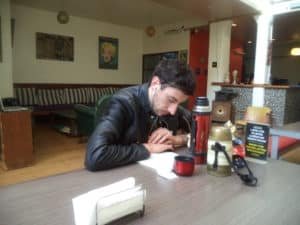
Philosopher chef-wannabe Henry, who I nicknamed King Henry of Shakespearean fame, solemnly tells me we are all here to learn. I agree with this young man wise beyond his years,
I met Henry, a young, tall vegetarian with a thoughtful demeanor who was looking for a job and who spoke with calm confidence about his prospects. He likes to cook and wants to learn to be a chef in a Japanese restaurant. One day he was reading a Spanish novel and he informed me that he reads a lot, because “we are here to learn.” In another time and place Henry could have been a Benedictine monk. Henry is a thinker.
This week I met Ana, from Mexico, who for three years was a commodities trader in beans and honey (of all things), and who from Mexico handled the import and export of those items from North Dakota, Mexico, and Argentina, to Germany, Dubai, and many other parts of the world. Ana’s father owns a brick factory in Mexico, but she had no desire for small-town life and wanted to advance her career and insider knowledge of her chosen industry.
Ana taught me that honey, just like wine, has terroir, and that there are many kinds and varieties of honey, depending on where the beehives are located. Some honey comes entirely from the blossoms of one particular tree. Honey comes in many different colors, and I tasted honey that was unlike anything I had seen or tasted before. The taste was unbelievably good. Ana has fire in her eyes and is very focused. She has a great sense of humor about being the resident Mexican at Puerto Limon.
Emiliano somberly introduced me to the world of Argentinian mate, a sort of tea ceremony that seems to have a local cult following and is practiced with a careful attention to detail worthy of a shaman.
Fernando is a local artist who paints with a medium composed primarily of coffee grounds, a technique he learned in Colombian art school. He is talented and has a nearby studio which I visit several times a week so that he can teach me Spanish and I can teach him English.
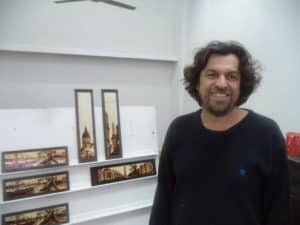
Artist and tango dancer Fernando and I trade language lessons. Fernando creates Argentine landscapes with coffee grounds as his medium.
It amazes me how many here are invested in helping me learn their language and they follow me around pounding vocabulary and verb conjugations into my head. I find it touching and occasionally exhausting, but I really, really want to learn their language out of respect for them. They have all known Americans who felt it was their responsibility to learn English to accommodate their tourist visitors, rather than vice versa. So I have a sense of responsibility that I cannot let them down.
One last thing, before I close out this post. There is a large-screen television mounted on the wall of the community room, and it goes largely ignored. For the first time in over half a century, television is no longer the primary form of communication or entertainment. No one is watching. They are all either talking face to face here, or they are on their smart phones. This is a seismic change.
I have two new roommates. A young lady from Rio de Janeiro, Brazil named Liliana, who is very shy and who is learning to speak both English and Spanish. She speaks Portuguese. I have shared food with her several times and now she wants to reciprocate. We communicate through Google translation. My other new roommate is a young doctor from Columbia. I never thought I would share a bunk with a doctor unless it was Doctors Without Borders or the end of the world.
I do not romanticize hostel life. It is survival of the fittest here. You put your name on your leftovers in the refrigerator or your food imay be gone in the morning. There are always hungry people prowling for unlabeled scraps of food. Electric plugs for recharging batteries are at a premium. Everyone is 100% responsible for their own belongings and things do disappear. Awareness and mindfulness are essential at all times. Stupidity and forgetfulness can be punished mercilessly and no one is here to save anyone else. Very few here are drifters; everyone seems to be on the way to somewhere else. Every day I learn a few more words and phrases in Spanish and my mistakes are greeted with good-natured laughter. I am starting to unwind and relax my North American grip. I am learning to exhale. It’s a beginning. I am privileged to be a guest in the lives of these, my new friends.
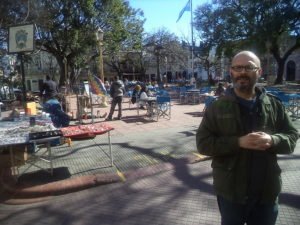
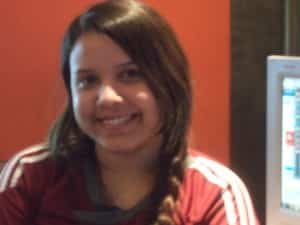
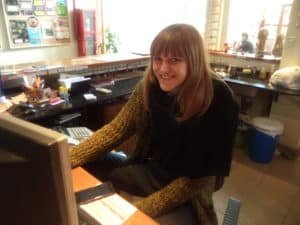
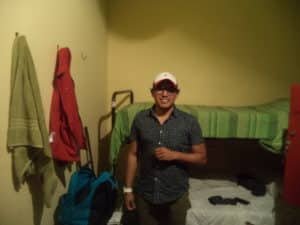
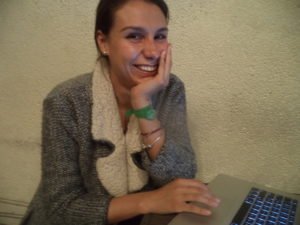
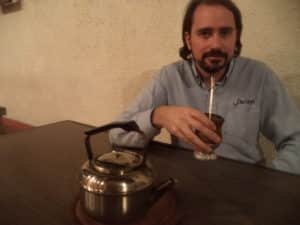
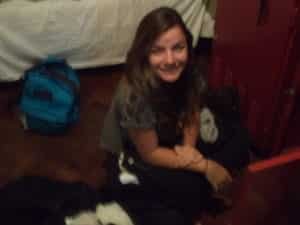
Living in the moment…meeting individuals from other countries on a daily basis and learning a new language..Your personality and zest for life and adventure will keep us looking forward to your next post!
I have been concerned about the Spanish part. I have always been told that it is much harder to learn a new language later in life. Maybe the neurons are more stubborn or afraid. Anyway, there are about fifty people in this hostel, and a number of them are longer term: they are here for months at a time. They are all lovely people, young, full of life and ideas and ambitions, and of course they all speak Spanish; Argentine Spanish, Spain Spanish, Mexican Spanish, Peru Spanish. Some are Brazilian and their mother tongue is Portuguese, but they also speak Spanish. Even the young Russian guy who showed up two days ago speaks Spanish. Everybody except me, it seems. So I asked a group of them if they would all please teach me Spanish and make me speak Spanish whenever they see me. So we have this plan in place: Spanish in 90 days or Bust. The countdown is at 86 days. We are planning a big party at the end. They are taking me seriously. This bootcamp is brutal. Whatever was I thinking? 🙂
Love your posts. You are definitely the right spirit for this open life…..Muchas Gracias por llevarme a lo largo.(Google Translate).
Hi Anne, and thank you. I am constantly amazed at the goodwill of people I meet, their curiosity, and their willingness to return a smile from a stranger. I went next door to a popular local eatery and tried out my new Spanish. I ordered 1/2 a roast chicken to go. What I got was two roast beef sandwiches to go. I don’t know if my Spanish was that bad or if it was their mistake, but apparently they knew where I lived and followed me home to correct the mistake. Now whenever I walk past the open door of this eatery, everyone inside waves to the gringo with a big grin on their face.
I have no doubt, John, that you will soar in Argentina!!….whatever level of Spanish you achieve….your attitude and smile is your success!! 👍
Hello my friend. Reading your words illuminating the new chapter of your life is such a treat. I experienced your pain, determination, doubt, and open heart to the people and place you have landed. I look forward to new chapters. –MaryGo
Thank you, MaryGo. Discerning readers make better writers!
John,
For some strange reason, as I read your post I thought of Ernest Hemingway. I like your pictures and the details of living the dream in your hostel environs. This experience is just the stepping stone into the rest of your life. Many preach to follow your dreams, but very few have the courage to do so.
Harlan J. Hunter
Well I’ve never been a wartime ambulance driver, for one thing. But I have had almost as many wives. And I have delivered pizza. Does any of that qualify me? I begin each day with uncertainty. After completing my inventory of body parts and finding everything in moderately good working order, I go to work with reassurance. Today will be a good day. By the way, loved your book Floor 6R. You hit a home run on your first novel! Keep ’em coming, Mr. Hunter.
VERY interesting article. It’s going to be fun to see what you do with your travel writing after all other cool things you’ve done!
Arlean, I am so fortunate that you were my first Argentina expat experience! You are the most amazing almost-octogenarian imaginable; your energy level is daunting and your spirit indefatigable. And what you have personally overcome with health challenges redefines courage! I am grateful that you so generously share your wisdom as a lifelong writer and editor yourself. Hugs, and thanks for your friendship!
Su historia es increíble y estoy siguiendo su aventura
Gracias por compartir mi trayecto, Phyl.
John,
I also enjoy the comments of your readers and your responses. I find your blog to be very entertaining. At my age, I am happy just look at the stars, while you being as old as I am are reaching for them. Life is full of ups and downs. We all know that in life it is not how you fall; how you get up is what is important.
Keep up the good work.
Harlan J. Hunter
Yes, and some mornings it takes more effort than on others–to get up, that is. Or in my case, to get down–from my top bunk. I’ve been thinking about developing a slide; less impact when I get to the bottom. I am looking forward to tomorrow: I have an interview scheduled with one of the finest silversmiths in the world, and whose office and workshop is three blocks from where I live. The last three presidents of the U.S. have been clients of his, not to mention the Queen of England and half of Hollywood. This neighborhood is amazing! When you get your first novel translated into Spanish, let me know, and maybe I can help you market it in South America.
Jhonnn, adoro ler seu blog! Continue contando suas aventuras e estou morrendo de saudades! I miss u!! 😀
Liliana, Você me honra lendo meu blog. Eu nunca poderia esquecer o meu muito doce e bela colega de quarto. I miss you too! Hugs!
Great John! Best Regrads for all the guys!!! Nice to met everyone!
Daniel, thanks for checking in and it was a pleasure to meet all you craft beer entrepreneurs with your boundless enthusiasm for your businesses, marketing plans, and products. Such passion! I got to spend some time with Martin, the school owner and instructor and was also able to attend the semi-annual craft beer festival here in Buenos Aires. I am working on an article about the school and want to learn more about your story too. Cheers! Thanks for reading and for subscribing!